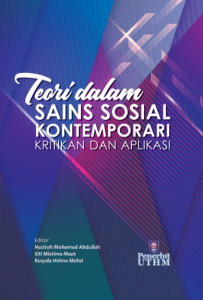TEORI DALAM SAINS SOSIAL KONTEMPORARI KRITIKAN DAN APLIKASI
Synopsis
Naskhah ini, yang berkisar kepada teori dalam bidang sains sosial adalah himpunan usaha dan garapan penulis-penulis muda yang berbakat dan mahir dalam bidang masing-masing. Penghasilan buku ini didorong oleh betapa pentingnya kefahaman dan ketepatan teori dalam memastikan penyelidikan yang dibuat bersandarkan asas yang kukuh bagi menghasilkan penyelidikan yang berkualiti dan berimpak tinggi.
Buku ini merupakan buku yang terawal seumpamanya di pasaran. Walaupun dengan penjelasan yang minimum, ia mampu mengutarakan idea daripada pelbagai teori dalam Bahasa Kebangsaan. Kami juga yakin ia mampu menjadi penanda aras untuk penulis-penulis di masa hadapan untuk mencabar dan mengetengahkan lagi isu-isu yang berkaitan teori yang lebih segar serta kontemporari.
Downloads
References
Ahmad Zamri, K, & Syed Mohammad, S. A. (2018). Relationship between adversity quotient and academic well-being among Malaysian undergraduates. Asian Journal of Scientific Research, 11(1), 51–55.
Asmadi Abdul Rahman, Asyraf Ab Rahman, Ahmad Fazullah Md Zainal Abidin, & Imaduddin Abidin. (2007). Adversity Quotient (AQ) teras kekuatan ummah: analisa teori kecerdasan (AQ) terhadap sirah Rasulullah S.A.W. Prosiding Seminar Warisan Nabawi (SWAN2007), 341–347. Nilai: Universiti Sains Islam Malaysia (USIM).
Bandura, A. (1977). Social learning theory. New Jersey: Prentice Hall.
Bingquan, L., Weisheng, C., Xudong, Z., & Wenxiu, Z. (2019). The Compilation of the Adversity Quotient Scale for College Students. Psychology and Behavioral Sciences, 8(1), 9–14. https://doi.org/10.11648/j.pbs.20190801.12
Chunin, M., & Petchprayoon, C. (2018). Adversity Quotient and Resiliency Predicting Career Success of Teachers in Secondary Schools. Association of Private Higher Education Institutions of Thailand under the Patronage of Her Royal Highness Princess Maha Chakri Siridhorn, 7(2), 49–62.
Cura, J. M., & Gozum, J. L. (2011). A correlational study in the Adversity Quotient® and the mathematics achievement of sophomore students of College of Engineering and Technology in Pamantasan ng Lungsod ng Maynila (Bachelor Thesis. University of the City of Manila). Retrieved from http://www.peaklearning.com/documents/PEAK_GRI_gozum.pdf
Fitri, Y. (2019). The Role of Adversity Intelligence in Encouraging the Implementation of Islamic Work Ethics and the Impact on Accountant’s Performance and Career Development of Accountants. KnE Social Sciences, 3(14), 619. https://doi.org/10.18502/kss.v3i14.4342
Grotberg, H. (1995). A guide to promoting resilience in children: Strengthening the human spirit. Alabama: The Bernard van Leer Foundation.
Gulan, X.-Z. M. R. De, & Caballero, R. T. (2013). Adversity quotient and openness to group diversity as predictors of job embeddedness. In C. P. Garcia (Ed.), Graduate Research Colloquium. Manila: The University of Santo Tomas Graduate School.
Hajidah, I. (2009). Hubungan antara Emotional Quotient (EQ) dan Adversity Quotient (AQ) dengan tingkat stres pada korban lumpur Lapindo (Studi korelasional di pengungsian baru Desa Kedungsolo Porong Sidoarjo) (Bachelor Thesis. Universiti Islam Negeri (UIN) Maulana Malik Ibrahim Malang, Jawa Timur, Indonesia.). Retrieved from http://lib.uin-malang.ac.id/?mod=th_detail&id=05410073




